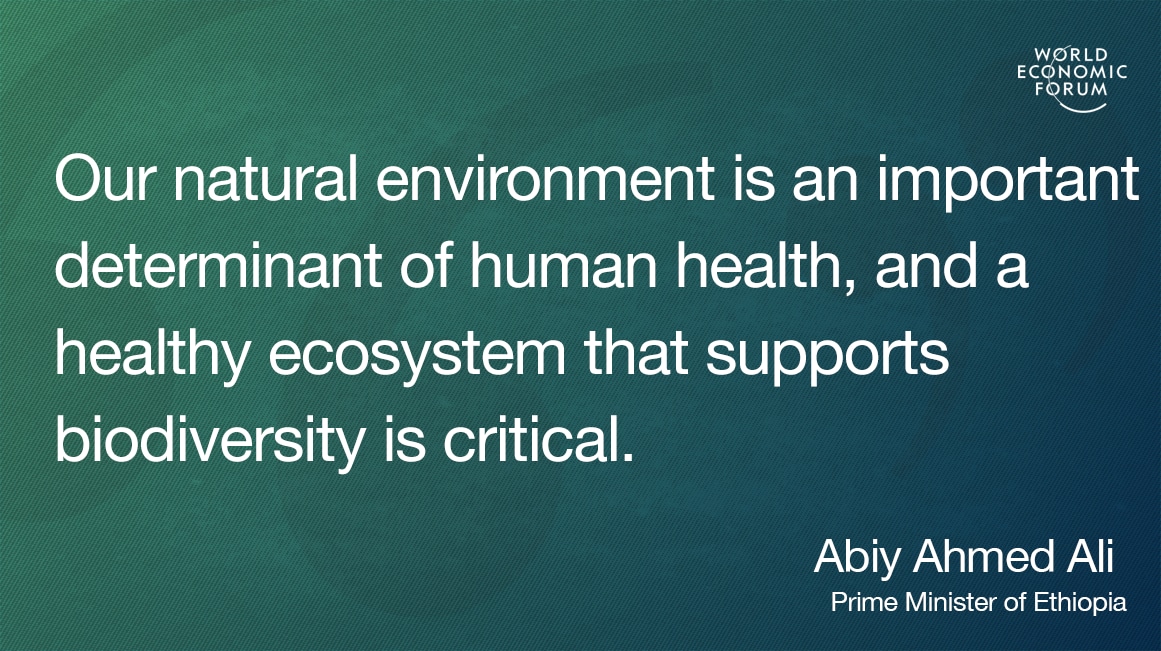Ethiopia wants to plant 5 billion seedlings this year

The country says it planted more than 4 billion seedlings last year.
Image: REUTERS/Tiksa Negeri
Stay up to date:
Future of the Environment
- Ethiopia has announced ambitious plans to plant 5 billion seedlings.
- It's part of a larger goal to plant 20 billion trees.
- Global initiatives – such as 1t.org – hope to drive reforestation efforts.
For World Environment Day on 5 June, the Ethiopian government has announced plans to plant 5 billion seedlings during this year's rainy season.
"This is part of our larger goal of planting 20 billion trees during a four-year period," explained Ethiopian Prime Minister Abiy Ahmed Ali.
He added that more than 4 billion seedlings were planted last year – including close to 350 million in one 12-hour period in July 2019.
Accept our marketing cookies to access this content.
These cookies are currently disabled in your browser.
The high survival rate of these seedlings is nature's encouragement to "forge ahead", he added.
What’s the World Economic Forum doing about climate change?
Going green
The planting is part of the country's Green Legacy Project, which aims to build a green and climate-resilient economy.

At the same time, the COVID-19 coronavirus pandemic has reminded people of their own vulnerabilities, explained the Prime Minister: "Our natural environment is an important determinant of human health."
The pandemic will test our resilience, but the planting will be done in a COVID-responsible way, he added.
Accept our marketing cookies to access this content.
These cookies are currently disabled in your browser.
Putting down roots
Tree-planting projects have been introduced around the world. Pakistan, for example, paid people who'd lost their jobs as a result of pandemic to plant trees.
Accept our marketing cookies to access this content.
These cookies are currently disabled in your browser.
And, at the Forum's Annual Meeting in Davos this year, we launched an initiative to grow, restore and conserve 1 trillion trees around the world.
"Nature-based solutions – locking-up carbon in the world’s forests, grasslands and wetlands – can provide up to one-third of the emissions reductions required by 2030 to meet the Paris Agreement targets," the Forum said at the time.
Further emissions reductions will be necessary from the heavy industry, finance and energy sectors.
But scientists have cautioned that reforestation cannot be a substitute for lowering emissions:
“It’s definitely not a solution by itself to addressing current climate change," NASA scientist Sassan Saatchi said last year. "To do that, we need to reduce human emissions of greenhouse gases. But it could still have some partial impact on our ability to reduce climate change," she added.
Accept our marketing cookies to access this content.
These cookies are currently disabled in your browser.
Don't miss any update on this topic
Create a free account and access your personalized content collection with our latest publications and analyses.
License and Republishing
World Economic Forum articles may be republished in accordance with the Creative Commons Attribution-NonCommercial-NoDerivatives 4.0 International Public License, and in accordance with our Terms of Use.
The views expressed in this article are those of the author alone and not the World Economic Forum.
Related topics:
Forum Stories newsletter
Bringing you weekly curated insights and analysis on the global issues that matter.
More on Climate ActionSee all
Luis Antonio Ramirez Garcia
April 24, 2025
Christian O. Deseglise and Louis Downing
April 24, 2025
Sarah Franklin and Lindsey Prowse
April 22, 2025
Jeff Merritt
April 22, 2025
Elizabeth Mills
April 17, 2025






